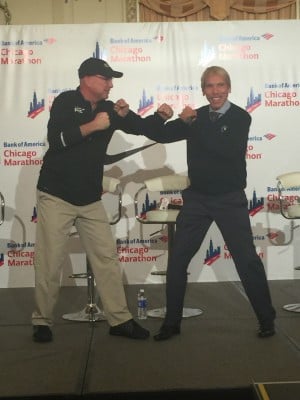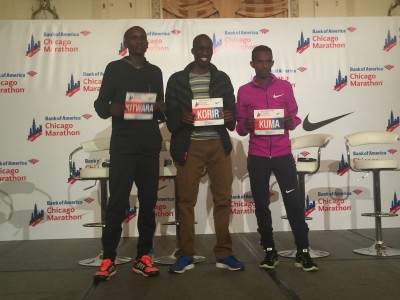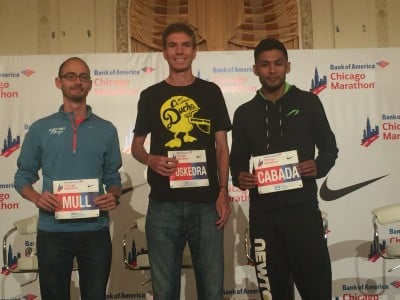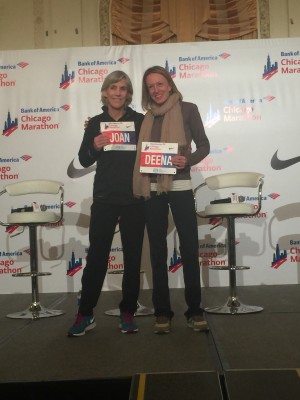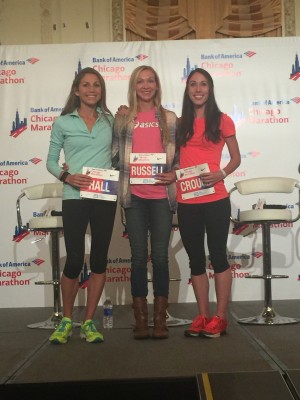The Inside Scoop on the 2015 Chicago Marathon – Meet the LetsRun.com Longshot, Discover the Secrets To The Fountain of Youth, and Have We Found The Solution To The Sport’s Doping Problems?
by LetsRun.com
October 9, 2015
CHICAGO — It was a busy day on Friday in the media room at the 2015 Bank of America Chicago Marathon as first the elite press conference was held and then 56 different athletes were made available for one-on-one interviews.
We present to you the 14 most interesting things we learned below. Hopefully you’ve got plenty of time to geek out about Chicago as there are nearly 3000 words below.
1) Carey Pinkowski credits Phil Hersh for inspiring him to ditch rabbits
When asked where he got the idea to ditch rabbits, Pinkowski gave credit to the Chicago Tribune’s Phil Hersh (even though we’ve been begging for it for years). He said he and Hersh were talking about the greatest races in Chicago history and he realized they almost always were races that featured “phenomenal head-to-head matchups” of people “going after it” whether it was Sammy Wanjiru and Tsegaye Kebede in 2010, Khalid Khannouchi and Moses Tanui in 1999 (where Khannouchi broke the WR), or Joan Benoit versus Ingrid Kristiansen in 1985. He said that after four world records were set in the span of three years in Chicago, he got a little “caught up” in battling with Berlin to try to set world record.
2) Wesley Korir loves that there are no rabbits and wonders if the lack of rabbits will help the anti-doping movement
The lack of rabbits was very much a topic of conversation today in Chicago.
2012 Boston marathon champ Wesley Korir, who has a modest (by AWMM-winning standards) pb of 2:06:13, was obviously thrilled that there will be no rabbits this year.
“When I look at my history, all of the races I’ve won [I realized] there’s been no pacers so I’m excited,” said Korir.
Later on during his stay on the stage, Korir came up with the most interesting thought of the day. When asked about the doping problems in our sport and particularly in Kenya of late, Korir said he thought the focus on time had played a role. Korir:
The doping issue that we face right now in in the sport is not a one-country problem, a one-person problem. It’s [a problem f0r] the entirety of the nations that love sport. And all of us have to come up with a voice and joint venture to overcome this obstacle.
What is happening right now is a very good start – especially when we move away from thinking about time. The problem that we’ve had…is the issue of time. The issue of the under two-hour marathon – that is the problem. When you put that pressure on an athlete, [you end up with doping problems]. Running 2:03, running 2:02, running 2:01 it is superhuman and we have very few superhumans who can run that time.
And when you have a kid that is just starting to race and their mind is that to make it and become successful as a runner that they have to run those times, then you are causing them do something that is not acceptable.
We need to go back to the past, to the sport that we all love – to the sport we all love of competition and giving everyone an opportunity to win and become successful in the sport. When you do that, then you will overcome this (doping) obstacle.
3) Men’s race favorite Sammy Kitwara is in great shape and very confident but not thrilled with the lack of pacemakers.
The fastest man in the men’s field, Sammy Kitwara (2:04:28 pb), wasn’t afraid to admit he wished there were rabbits in the race.
“I can say I believe in pacemakers,” said Kitwara, who then had the members of the media laughing when he turned to Korir and deadpanned, “He is saying that he can win without pacemakers. We shall see.”
Kitwara said Sunday’s race will be the first marathon he’s ever run without a pacemaker. “[But] I will do it and I will manage,” said Kitwara on stage. Later in a sit-down interview with LetsRun.com, Kitwara said he didn’t know there weren’t going to be pacemakers until recently.
As for his fitness, Kitwara was very bullish. “[Before finding out there weren’t pace makers], I was thinking I could run 2:03,” said Kitwara, who ruled out that possibility on Sunday.
Kitwara’s talk of 2:03 fitness should mean a lot as press conference emcee Tim Hutchings said last year Kitwara predicted to the second (2:04:28) what he’d run. When asked how fast could he run this year Kitwara said, “Because there are no pacemaker(s), I cannot predict my time. I predict winning.”
Kitwara did rule out a 2:04 time however and as he said to us, “I have a question for you, ‘Have you ever seen someone run 2:04 from the first step without a pacemaker?'”
Other than the wind-aided Boston course, we couldn’t say that we had but did point out that Geoffrey Mutai nearly ran 2:04 when he ran 2:05:04 in New York in 2011.
Kitwara also said that he knows who the best marathoner in history is….Eliud Kipchoge.
“Who is the best marathoner ever? Eliud Kipchoge. Eliud is very consistent. He’s run 2:04 three times. 2:05 two times. Someone who is consistent is clean,” said Kitwara about Kipchoge, who is the training partner of one his competitors on Sunday in Chicago, Lucas Rotich.
4) Looking for an upset pick? We’ve got just the guy for you.
Speaking of Lucas Rotich. Despite having just the seventh-fastest pb in the field (2:07:17), Rotich can’t be discounted on Sunday. We caught up with Rotich this afternoon and asked him if he considered Kitwara to be the favorite.
“No. I am,” said Rotich. “Really?” we replied. “Yeah I believe in myself.”
Kenyans historically talk confidently before races but Rotich has several reasons to be confident he could win on Sunday. In his last marathon, he won in Hamburg in 2:07:17. The man who was 2nd in that race was Ghirmay Ghebreslassie, who won Worlds in August. Perhaps more importantly, Rotich trains with the world’s best marathoner – Eliud Kipchoge.
“The man I train with ran very well [in Berlin],” said Rotich, who clearly has gained confidence from hanging with Kipchoge in practice and vanquishing the world champ in Hamburg. “My training has gone well. No problems,” added Rotich.
5) Shhhhh. Don’t tell anyone but American Fernanda Cabada feels he’s in the best shape of his life
When Cabada (2:11:36 pb) was brought on stage, he didn’t want to talk too much about his fitness. He said he thought it was better than ever but didn’t want to say much more than that.
“I don’t want to say this to put too much pressure but I’m in the best shape of my life,” said Cabada. “I don’t want to shoot myself I the foot [by talking about it too much],” added Cabada, who implied that in the past when he’s talked big before a marathon it hasn’t always gone well.
“I want to give myself a chance to run the fastest I’ve ever run but just remember it’s a race. I just want to be really level-headed. The fact that there are no pacers takes off a lot of the pressure.”
As for the upcoming Olympic Trials, Cabada is excited to be considered a contender, “I started running when I was 10 years old [and the Olympics are] something I’ve dreamed about every day for hours. I’m just trying to embrace this journey. I have a real legitimate shot and I’m really happy to say that.”
6) Stay at Home Dad Luke Puskedra Is Also Ready
We did a video interview with the American which you can watch below. Before the video interview, Puskedra, who became a father four months ago, seemed pleased to not have a lot of pressure on himself heading into the race. After running a 61:36 half in college, the expectations to try to become America’s next great marathoner weighed down on him. “I felt a lot of pressure at that point (after the fast half). I had high hopes but it turned more into letting myself down instead of [pushing] myself up.
“My shape going in is good. I didn’t decide to race here [until three weeks ago]. I was going to do more track type training to get that different stimulus [before the Trials].”
7) Free Race and Life Advice From 1984 Olympic Champ Joan Benoit Samuelson
Samuelson reiterated today that she’s still not sure if she’ll race on Sunday due to a nagging stomach virus.
“The heart says go, the gut says no,” quipped Samuelson.
When asked about what advice she’d give to the American Olympic hopefuls, Samuelson said there is no substitution for passion.
“It has to come from here (pointing to her heart). You have to be passionate about what you are doing in life. As Abbott says, “Live life to the fullest…
“You have to go out and run your own race. [That’s] something we all need to do throughout our life.”
8) The Key To Not Slowing Down A Ton As You Age – Continuing to Set Lofty Goals
It’s interesting to note that perhaps the top two American women in the field are both 40 or over – Deena Kastor (42) and Blake Russell (40). Both talked about how always having big goals to chase has kept them from slowing down very much over the years.
“I just keep putting these lofty goals out there,” said Kastor, who said more times than not she comes up short of her goals but in the end that doesn’t really matter as setting big goals is the only way you’ll find the motivation to do the incredible amount of work it takes to chase them.
The self-coached Russell said similar things as you can see in the video interview below. Before the interview, she said that her training is similar to what it’s always been like but she just runs a little more than she used to but slightly slower. “The training is still really good. I’m still hitting the times I want to hit. I’ve slowed down a little bit but I’m running longer which is great for the marathon.”
As for not having rabbits, Russell couldn’t care less. “I realized I’ve never run a road race with a rabbit. I usually end up being the rabbit [myself],” said Russell, who said she only ran a single track race in her career with a rabbit.
Russell thinks that Colleen De Reuck‘s American masters marathon record of 2:28:40 is a possibility. That would be quite an accomplishment as it would mark a pb for Russell (pb of 2:29:10 from 2005).
58-year-old Joan Benoit Samuelson also said the continuous setting of natural new goals has kept her at it as well. She initially had said the 2008 US Olympic Trials in Boston would be her last competitive race but then the next year people wanted her to run to celebrate the 25th anniversary of her Olympic win. This year, the idea of running within 30 minutes of her PB and win at Chicago took over.
“For me, the psychological part is just as important as the physical part,” said Samuelson.
When asked about February’s Olympic Trials, Kastor didn’t 100% say she’d do them. “I don’t even in my mind feel [right now] that I’m even running the Olympic Trials. I’m sure there will be a dozen times out there [on Sunday] where I think, ‘This is my last one,’ as I’ve thought that in probably my last 10 marathons.”
Kastor said her #1 focus for the Trials will be to help her teammates get ready for them.
9) Both Sara Hall and Sarah Crouch Will Be Running For More Than Themselves on Sunday
Hall, who had a disastrous marathon debut in LA earlier this year (2:48:02), and her husband Ryan recently adopted four Ethiopian sisters from an orphanage.
The girls are finishing up their first week in the US and so far things have been going better than expected.
“So far it’s been fun. I thought there would be a lot more adjusting. It’s just been a joy to see them experience so many things for the first time,” said Hall, who added that girls had never been on an escalator or seen a vacuum cleaner.
When asked if she’d ever have biological children, Hall said it was possible but wouldn’t be happening any time soon as obviously she’s got her hands full for the time being. That being said, she said her daughters have already told her and Ryan they are hoping to get two younger brothers down the road.
As for the race on Sunday, Hall said she didn’t change much despite the result in LA.
“I haven’t changed too much as I thought I’d prepared pretty well,” said Hall. “I was happy with my half. I’ve done more mileage than I’ve ever done before in my life. I really enjoy the challenge of [the marathon].”
Zap Fitness’s Sarah Crouch really enjoyed last year’s race where she PB’d by 12 minutes to 2:32:44.
“Last year, Chicago was an absolute dream. [But] I didn’t surprise my coach (Pete Rea) though as he graded me at a B+. I think the biggest thing is having a coach believing in you. He makes me think I can run through a wall. Chicago was the race that sort of propelled me from the minor leagues to the major leagues.
“This summer I turned 26 and I’m always looking ahead and thinking, ‘Ok 2020 and 2024, that’s my window. That’s my shot.’ I keep telling myself ‘I have time, I have time,’” said Crouch. “But 18 days ago, my (former) teammate Cameron [Bean] went out for a run and was hit by a car and killed and I realized I don’t have time – time is an illusion. I have now.
“I think that I owe it to myself, and I owe it to Zap and Reebok and, frankly, I owe to Cameron to leave every ounce of my God-given ability on that course in LA. So I’ll stand on that starting line with every intention of making that team. It might not be probably but if it’s possible I’ll do it.”
10) The Africans Don’t Necessarily Move Up To The Marathon For Money But The Money Is Much Better at 26.2
At the 2011 and 2013 worlds, Ethiopia’s Abera Kuma, who now is just 25, was 5th in the 5,000 (2011) and 10,000 (2013). But now he’s a full-time road racer. We asked him if he moved up for monetary reasons.
“I didn’t come to the marathon for money. I ran on the track a lot but I was never able to be first. I think I lacked the finishing speed so I thought I might be able to be better at the marathon,” said the Rotterdam champ. who has a 2:05:56 pb, through interpreter Sabrina Yohannes.
When asked if the money was better on the roads, Kuma said, “yes” and that he makes “much more” now than when he was 5th in the world on the track.
As for his prospects on Sunday, Kuma was optimistic.
“I did have a slight injury in the middle [of my buildup] but now I’m doing very well,” said Kuma through Yohannes. He said it was a hamstring issue two months ago. When I asked him if he was worried he might not be in good shape as a result, he didn’t need to wait for the interpreter to finish. He quickly shook his head no and said, “I’m fine right now. There is no problem.”
11) Sports Gene In The Flesh
We’ve long felt the small stature of many of the African-born marathoners gives them an advantage over their American counterparts. Along those lines, we were struck by how tiny and skinny Kuma was. When we asked him for his height and weight, he said he was 1.65m tall (5’4.75″) and 52 kgs heavy (114 lbs).
12) Leading Women Birhane Dibaba and Florence Kiplagat Talk
Birhane Dibaba (2:22:30 pb) on Sunday’s Race: “For Sunday, I’ve trained very well and if God helps me I should be able to win. I’ve trained very well. I’d very much like to win it.”
Birhane Dibaba on the Ethiopian Selection For 2016: “It’s my understanding that anyone who wins a major marathon has a good shot at being selected.”
Florence Kiplagat (2:19:44 pb): “For Chicago, I’m trying to win as I’ve never won in Chicago and it’s been a long time [since I won] in the [Abbott] World Marathon Majors.”
13) The weather forecast isn’t great but it’s not totally horrible either.
The race is due to start at 7:30 am CT.
14) Wheelchair racing is officially bizarre
We learned a lot of about wheelchair racing today. We already knew that wheelchair racing in the marathon is nothing at all like marathon running as some wheelchair racers can do all of the major marathons. But we didn’t know the following three facts that defending men’s champ Joshua George taught us today.
i) Wheelchair racers can pretty much do every single event in track and field.
“The pace we are going is pretty much the same from 800 meters through the marathon, it’s just the strategy that varies,” said George, who in addition to winning Chicago last year also recently set a new world record for 800 meters. He said in Rio he definitely wants to do the 800, and also probably the 1500 and marathon.
If you think that’s a lot of events, then please realize that defending women’s champ Tatyana McFadden said today she plans on doing every single wheelchair event in Rio – all six events from the 100 to the marathon.
ii) 11 guys finished within 11 seconds of each other last year in Chicago.
Perhaps the best way to think of it then is that wheelchair racing is kind of like cycling but instead of pedaling with your legs, you pedal with your hands.
iii) 2015 Chicago is serving at the Paralympic Trials so the top 2 across the line are going to Rio.

